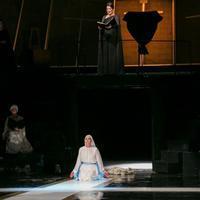“As time passes, Bach’s music grows ever more weighty and significant,” said Pilinszky, with reference to the St John Passion.“This Baroque musician has become the most modern composer of our time. He is at once both timeless and hyper-modern, or, to be more precise: the one we have the most need for.”
Johann Sebastian Bach’s Saint John’s Passion depicts the suffering and death of Jesus based on the words of the Apostle Johnthe Evangelist. The work was written for Good Friday of 1724 and is a wonderful combination of theatrical work and oratorio.
While “Matthew” weeps and ruminates, “John” points the way forward from there. “Matthew” is a mass, while “John”is an opera. Or not quite. From research done by scholars, we know a great deal about the role that opera played in Bach’s era. For some reason, however, the composer himself never wrote opera, only oratorical works whose participants were in true dramatic roles. Probably the greatest virtue of Saint John’s Passion is that it allows the Good Friday story – despite all of its cruelty and pain – to ring out with a truly positive clamour of brilliant and hopeful music heralding the joy of the Resurrection. Károly Eperjes will be bringing the genre into a stylised arena within the setting of early Christianity, while also bringing the magic of cinema into the mix.
Cast and Creative team for St John Passion at Hungarian State Opera, Opera House
Conductor
Kálmán Strausz
Cast
Evangelist
József Mukk
Jesus
István Kovács
Pilate
N.N.
Soprano
Zita Szemere
Alto
Atala Schöck
Tenor
Zoltán Megyesi
Bass
Domonkos Blazsó
Creators
Composer
Johann Sebastian Bach
English subtitles
Arthur Roger Crane
Staged by
Károly Eperjes
Costume Designer
Enik? Kárpáti
Set Designer
Balázs Cziegler
Choreographer
Balázs Vincze



